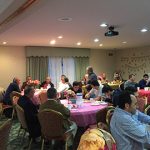THE OUTCOME OF HONESTY AND DECEIT
“Live honestly. Honesty leads to goodness and goodness leads to Paradise. Once a man has given himself over to honesty and heads in that direction, he will always speak the truth, always search for what is right. Thus, he will be recorded as “Siddiq” (Truthful) with God. Avoid lying. Lying leads to immorality and immorality leads to Hell. Once a man has given himself to lies will always lie. Thus he will be recorded as “Kazzab” (one who lies very much) with God.”
(Bukhari, Adab, 69; Abu Dawud, Adab, 80)
Honesty is one of the characteristics that all the Prophets had, whereas lying or deceit is the sign of hypocrites and disbelievers. Honesty is an important part of our lives, affecting our past, present and future; deceit is a shadow of darkness that pursues us throughout our lives. Nobody has ever found happiness with deceit or lies and people on the path of truth and honesty will never be deprived in this world or in the Hereafter.
Deceit is the most evident characteristic of unbelief; it is the means of opposing that which God perceives and knows. Lying has destroyed the morals and principles of modern society; it is a social disease that has turned the world into a nation of deceitful beings. There is no salvation for those nations who open their doors to deceit, allowing it to flow freely into every aspect of their lives and their homes, businesses, their political dealings, or military posts. Nor will there be any salvation for them. This is the most significant aspect of the Islamic mission, the most evident awareness of faith, the foundation of the principles of Prophet Muhammad. This is the greatest feature of all the teachings of the Prophets and scholars; honesty is the only means to spiritual and material progress in the universe.
On one hand, we have the honored servant of God, Prophet Muhammad who is the Pride of Humanity; while on the other hand, we have the display of unbelief and corruption of the soul, an obvious trait of the devil.
The example of the first word in the hadith, birr (goodness), refers to purity of thought and action in human life; it is an expression of faith of such vast scope that it covers many aspects of life and favorable actions, including honest thought, honest speech, honest intentions, honest actions, and above all an honest way of living. However, the word fujur (immorality) is the complete opposite; it is the result of evil, it is the basis of deviant thought, speech, and evil actions, and it is an attribute of Hell.
In the hadith, a siddiq and a kazzab are mentioned side by side. The first has integrity, which indicates a person who has made honesty and truthfulness his way of life, the second example is one who has become a habitual liar. Both words are inflected to express the top level of the relevant adjective; accordingly a person who takes pride in their honesty, speaking and acting in a truthful manner, is sure to reach the affection of God at sometime during their life, while the person who takes pride in lying and who is dishonest in their everyday actions will become the epitome of dishonesty.
The final destination of these paths, although some are long and others short, although some gleam with light and security while others are misty and dangerous, is either Paradise or Hell. The path that leads to Paradise consists of various stages of blessings and encouragement, while the one that ends up in eternal disappointment consists of nothing but great disadvantages and obstructions.
The matter that we have tried to bring to everybody’s attention here is what are the consequences of honesty in this world and in the Hereafter and the damage that dishonesty can do to both individuals and to society; if we have been able to convey this in such a brief explanation, this is due to the great words contained in the hadith of the Prophet.
Related Posts
- August 11, 2014
- 0 Comment









